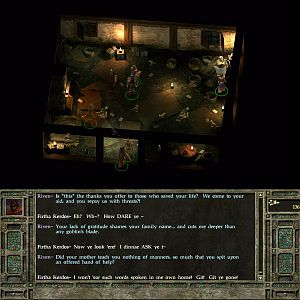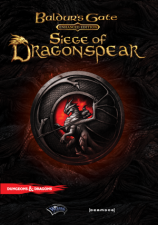-

- Forums
- Chatrooms
- Gallery
- Gameplay Videos
- Upload
- Articles
- Mod Reviews
- Shop SP: Games, Movies, Books

In the early days of August, we've received an invitation from Edmonton to attend an event showcasing BioWare's upcoming spiritual successor to the Baldur's Gate series, Dragon Age: Origins. As we've been following the development of the game quite closely here at Sorcerer's Place (you can only replay Baldur's Gate 2 a few dozen times before, well, it starts getting repetitive), we've naturally wasted no time in picking a lucky winner to be hosted by BioWare.
Now that he's finally allowed to give us his impressions, Beren shares his views on Dragon Age: Origins.
* * *
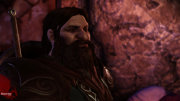 One of the most anticipated releases in the world of CRPGs is coming this fall, BioWare's Dragon Age: Origins, an epic dark fantasy game that will be released this November. Dragon Age: Origins has large expectations to fulfill, to prove to fans brimming with anticipation that it will become the spiritual successor of the much celebrated Baldur's Gate series. The critical question for this preview, of course, is whether it succeeds.
One of the most anticipated releases in the world of CRPGs is coming this fall, BioWare's Dragon Age: Origins, an epic dark fantasy game that will be released this November. Dragon Age: Origins has large expectations to fulfill, to prove to fans brimming with anticipation that it will become the spiritual successor of the much celebrated Baldur's Gate series. The critical question for this preview, of course, is whether it succeeds.
I had the honor of being offered a chance to attend a press event hosted by BioWare, in Edmonton, Canada, during August 12 to 14. With BioWare being kind enough to offer a free hotel room, and being taken out on the town, as well as a chance to get an in-depth look at the game, this opportunity was just too good to pass up. Teresa Tyndorf and Erik Einsiedel were our gracious hosts. Some of the game's developers, including the Lead Developer himself, Michael Laidlaw, were on hand to give as a taste of what we can expect in Dragon Age. Also present were many representatives from various gaming magazines and game sites. Sprinkled throughout the events were social occasions, such as a tour through West Edmonton Wall. But the real emphasis was for us to experience first-hand the features, the process behind creating, and the joys of playing Dragon Age. All in all I'd have to say that I played the game for probably about 10 to 12 hours over the course of the event that took me fairly deep into the first chapter. We were also given several in-depth demos of the game features, as well as some of the creative processes. It will be an impressive product that will come out in November, I can say that much.
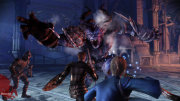 To begin with, an explanation of what is meant by dark fantasy in the context of this game is in order. First, the term dark fantasy is meant as a deliberate contrast to high fantasy. This is not a world with flowers, unicorns, and delicate princesses, where you have no doubt that the good guys will win simply because they are the good guys. Evil has every possibility of triumphing in this setting. In fact, the odds are rather in its favour, something you'll find out the hard way early on in the game. And when evil wins or makes progress, this won't be Maleficent smugly laughing at the prospect of Princess Aurora sleeping forever. Terrible things are happening in the game as your character progresses, with the promise of even greater horrors should you fail. And it is not merely alluded to, the graphics engine is going to make a point of making you see much of it for yourself. Secondly, even the good guys are not very deserving of the "good" label. Players who are supposed to be allies for the cause against the coming menace are usually flawed, and often deeply so. Self-interest is easily noticeable in almost everyone you meet, with only the precise details that require filling in. For example, Dwarven societies only hold up codes of honor, duty, and loyalty as mere charades. It's all a cover for their endless dog-eat-dog race. Others will nominally be out to help against the coming darkness, while secretly hoping to exploit the ensuing chaos to their own benefit. A definite cynical realism permeates the game.
To begin with, an explanation of what is meant by dark fantasy in the context of this game is in order. First, the term dark fantasy is meant as a deliberate contrast to high fantasy. This is not a world with flowers, unicorns, and delicate princesses, where you have no doubt that the good guys will win simply because they are the good guys. Evil has every possibility of triumphing in this setting. In fact, the odds are rather in its favour, something you'll find out the hard way early on in the game. And when evil wins or makes progress, this won't be Maleficent smugly laughing at the prospect of Princess Aurora sleeping forever. Terrible things are happening in the game as your character progresses, with the promise of even greater horrors should you fail. And it is not merely alluded to, the graphics engine is going to make a point of making you see much of it for yourself. Secondly, even the good guys are not very deserving of the "good" label. Players who are supposed to be allies for the cause against the coming menace are usually flawed, and often deeply so. Self-interest is easily noticeable in almost everyone you meet, with only the precise details that require filling in. For example, Dwarven societies only hold up codes of honor, duty, and loyalty as mere charades. It's all a cover for their endless dog-eat-dog race. Others will nominally be out to help against the coming darkness, while secretly hoping to exploit the ensuing chaos to their own benefit. A definite cynical realism permeates the game.
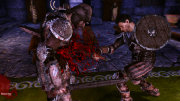 All of this makes for an incredibly rich and detailed campaign that BioWare has obviously invested a great amount of effort into putting together. And it also takes roleplaying to the highest order. I will be highly surprised if there is any potential decision in the game that is truly innocuous. That is to say, any decision can have repercussions for your character, however further down the road. And they can be pretty drastic indeed. It also means that many decisions have a definite complexity that goes far beyond previous RPGs. In the Baldur's Gate series, for example, you could notice relatively simple dichotomies. "Do I always avoid hurting the innocent or do I kill innocents just to play the part and keep my evil NPCs on board?" "Do I do this quest out of the goodness of my heart or do I charge to the max for it?" "Do I embrace my Bhaal heritage and develop my powers for murder or do I show restraint and a refusal to give in?" Many of the decisions in Dragon Age will pose moral quandaries of such complexity that there may at times not even be a black or white choice available, but rather having to pick out your shade of grey. For example, "Do I trust this person? Do I show trust and compassion and possibly put myself at risk, or do I instead harden my heart out of self-preservation?" "Do the ends justify the means?" "Do I sacrifice the few to save the many?" "What kind of person does my character become after this decision?" And the gaming world in which these kinds of decisions are constantly demanded of you is vast and complex. The developers assured us that a thorough playthrough will mean at least 100+ hours of gameplay. In this respect, Dragon Age does succeed marvelously in its claim.
All of this makes for an incredibly rich and detailed campaign that BioWare has obviously invested a great amount of effort into putting together. And it also takes roleplaying to the highest order. I will be highly surprised if there is any potential decision in the game that is truly innocuous. That is to say, any decision can have repercussions for your character, however further down the road. And they can be pretty drastic indeed. It also means that many decisions have a definite complexity that goes far beyond previous RPGs. In the Baldur's Gate series, for example, you could notice relatively simple dichotomies. "Do I always avoid hurting the innocent or do I kill innocents just to play the part and keep my evil NPCs on board?" "Do I do this quest out of the goodness of my heart or do I charge to the max for it?" "Do I embrace my Bhaal heritage and develop my powers for murder or do I show restraint and a refusal to give in?" Many of the decisions in Dragon Age will pose moral quandaries of such complexity that there may at times not even be a black or white choice available, but rather having to pick out your shade of grey. For example, "Do I trust this person? Do I show trust and compassion and possibly put myself at risk, or do I instead harden my heart out of self-preservation?" "Do the ends justify the means?" "Do I sacrifice the few to save the many?" "What kind of person does my character become after this decision?" And the gaming world in which these kinds of decisions are constantly demanded of you is vast and complex. The developers assured us that a thorough playthrough will mean at least 100+ hours of gameplay. In this respect, Dragon Age does succeed marvelously in its claim.
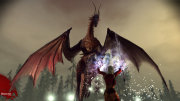 And there are indeed other features that invite comparisons with the Baldur's Gate series. During some phases of the game, you will have to go solo. However, there are a significant number of NPCs who can join, leading to a party-based game. Just like in Baldur's Gate 2, they have their own personalities, fetishes, as well as agendas and your decisions throughout the game will affect how supportive or friendly they are towards you. Some decisions can mean that an NPC will turn on you and try to kill you in a flash. Naturally, they will also have differences with each other. In that respect, Origins is exactly like Baldur's Gate 2, but even better. In Baldur's Gate 2, you had to remain content with the small version of the character portraits, block after block of text, and the occasional voice blurb. In Dragon Age, you get to watch them have it out with each other, facial expressions, jilts in the voice, everything included. In fact, there is one NPC whose less than wholesome allure and razor tongue will definitely remind more than a few fans of a certain Drow temptress... Romance, including same-sex, is in the cards and I should also mention that the game is targeted at a mature audience, with the North American "M (17+)" and European "18" ratings.
And there are indeed other features that invite comparisons with the Baldur's Gate series. During some phases of the game, you will have to go solo. However, there are a significant number of NPCs who can join, leading to a party-based game. Just like in Baldur's Gate 2, they have their own personalities, fetishes, as well as agendas and your decisions throughout the game will affect how supportive or friendly they are towards you. Some decisions can mean that an NPC will turn on you and try to kill you in a flash. Naturally, they will also have differences with each other. In that respect, Origins is exactly like Baldur's Gate 2, but even better. In Baldur's Gate 2, you had to remain content with the small version of the character portraits, block after block of text, and the occasional voice blurb. In Dragon Age, you get to watch them have it out with each other, facial expressions, jilts in the voice, everything included. In fact, there is one NPC whose less than wholesome allure and razor tongue will definitely remind more than a few fans of a certain Drow temptress... Romance, including same-sex, is in the cards and I should also mention that the game is targeted at a mature audience, with the North American "M (17+)" and European "18" ratings.
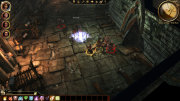 The combat system is a bit trickier to assess, but it is definitely different from the Baldur's Gate games and therefore comes down to comparing apples and oranges. It is simpler in the sense that there are fewer spells, and there are fewer races to choose from. Some players may miss certain tactical finesses from Baldur's Gate 2, such as spell sequencers and contingencies. At the same time, the game also holds out many possibilities for character customization that resemble prestige classes from the D&D 3.5e ruleset. There are also other factors that were not seen in (A)D&D computer RPGs, like for example enduring injuries to specific parts of your characters' bodies that impose penalties on them until they are fully treated. Also, combat is definitely a challenge. Firing off spells too early, not using enough resources from your inventory, not positioning your characters right, these and other missteps can easily lead to you getting overwhelmed. Managing combat situations will definitely be an acquired skill, and I anticipate that some will still demand a good deal of attention even from experienced players. From what I've seen, dragons in this game will not be pushovers like they were in previous RPGs. So my conclusion is that some may find the combat system simplified, but this is not necessarily a bad thing. I found it quite fun, and it didn't take away from my brief gaming experience.
The combat system is a bit trickier to assess, but it is definitely different from the Baldur's Gate games and therefore comes down to comparing apples and oranges. It is simpler in the sense that there are fewer spells, and there are fewer races to choose from. Some players may miss certain tactical finesses from Baldur's Gate 2, such as spell sequencers and contingencies. At the same time, the game also holds out many possibilities for character customization that resemble prestige classes from the D&D 3.5e ruleset. There are also other factors that were not seen in (A)D&D computer RPGs, like for example enduring injuries to specific parts of your characters' bodies that impose penalties on them until they are fully treated. Also, combat is definitely a challenge. Firing off spells too early, not using enough resources from your inventory, not positioning your characters right, these and other missteps can easily lead to you getting overwhelmed. Managing combat situations will definitely be an acquired skill, and I anticipate that some will still demand a good deal of attention even from experienced players. From what I've seen, dragons in this game will not be pushovers like they were in previous RPGs. So my conclusion is that some may find the combat system simplified, but this is not necessarily a bad thing. I found it quite fun, and it didn't take away from my brief gaming experience.
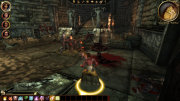 The graphics are also breathtaking and truly 3D with isometric and other possible views. I have seen a few complaints that they don't utilize the very latest standards, but as far as I'm concerned, this is mere nitpicking. Some of what I've seen inspired the same sort of cinematic reaction as when Gimli and Boromir see the Dwarf City in Moria for the first time. It can be quite astonishing to see.
The graphics are also breathtaking and truly 3D with isometric and other possible views. I have seen a few complaints that they don't utilize the very latest standards, but as far as I'm concerned, this is mere nitpicking. Some of what I've seen inspired the same sort of cinematic reaction as when Gimli and Boromir see the Dwarf City in Moria for the first time. It can be quite astonishing to see.
As for the Dragon Age toolset, I can't comment on this very much since I have no experience as a modder. The good news, according to the developers, is that it is based on the Neverwinter Nights 1 toolset, but with more power and options. The one thing that I observed first-hand was that the possibilities for custom character models and voicing are nearly infinite, and apparently you can make a sincere attempt at basing a character on a celebrity, for example.
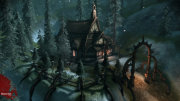 In summary, I believe that BioWare has succeeded in its claim to making Dragon Age: Origins the spiritual successor to the Baldur's Gate series, at least based on my first impressions. Certainly, some things are different from what we've gotten used to with Dungeons & Dragons games, but then again, Dragon Age: Origins is not a D&D game. In truth, it takes many elements to a degree that far exceeds what we've seen in past RPGs.
In summary, I believe that BioWare has succeeded in its claim to making Dragon Age: Origins the spiritual successor to the Baldur's Gate series, at least based on my first impressions. Certainly, some things are different from what we've gotten used to with Dungeons & Dragons games, but then again, Dragon Age: Origins is not a D&D game. In truth, it takes many elements to a degree that far exceeds what we've seen in past RPGs.
Overall, my gaming experience was incredibly fun, and I for one look forward to starting up Dragon Age: Origins as soon as it comes out.

